|
|
|
Speaking with Neal Asher
The Agony Column for May 13, 2002
Interview by Rick Kleffel
Looks a bit threatening, doesn't he? Nothing compared
to his fiction!
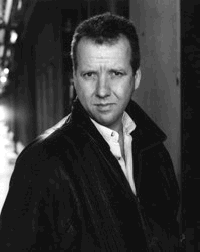
|
|
|
The Agony Column for May 13, 2002
Interview by Rick Kleffel
Looks a bit threatening, doesn't he? Nothing compared
to his fiction!

Readers of The Agony Column should know by now that I think Neal Asher is one of today's hottest Science Fiction writers. His debut novel, 'Gridlinked' is a kick ass piece of page-turning imagination. 'The Skinner' is a masterpice of macabre invention, with a beautifully layered story that builds up to unexpected heights. I recent wrote him and asked him about his writing. As you'll see, his great sense of humor and his wittily sharp powers of observation pervade everything he says. Read, enjoy, then check out 'Gridlinked' and 'The Skinner'. You'll be very glad you did....
TAC: Can you tell us how your various jobs have interacted with and influenced your writing ?
Neal Asher: Since leaving school, I've worked mainly in engineering and I reckon this has laid down a good technical groundwork for a lot of my fiction. (For example, reading recently someone describing something as 'strong as diamond' annoyed me - hit a diamond with a hammer then tell me how 'strong' it is, then try taking that same hammer to a ball bearing.) But the reality is that my day jobs have had as much an influence as much else in my life. My interests are what have the most influence and I think it the case, as with any writer, those interests are far ranging. I've read a lot of SF & F, also history, natural history, science magazines, and I continue to do so. I watch programs of a similar nature and try to learn from them. I enjoy learning things and feel my education will never end. Recently, working on my latest project, I've been delighted that it has required me to learn more about prehistoric life, ancient Latin, East Anglia's involvement in WWII, Henry VIII, the sun, Claudius ... What other job requires your interest to be so eclectic?
 |
 |
|
Van Vogt's seminal SF novels are cited by Asher as one of his standout inspirations. Asher's own work has much of the energetic feel of the SF classics. |
Roger Zelazny touched generations of minds with his wild worlds and words. |
TAC: What writers have you read that inspired you to write?
Neal Asher: I've been asked this question before and despaired. I possess a huge collection of SF and that's only part of what I've read (I used to visit the library periodically, use up their SF section, then go elsewhere). During certain periods of my life I've averaged a reading rate of ten books a month and most of those were SF or fantasy. As I put in the acknowledgements of The Skinner, the list stretches from Aldis to Zelazny, but some of those writers who stand out for me are Banks, A. E. Van Vogt, Cherryh, Tepper, Gene Wolfe, Zelazny, Julian May, and and ... oh bugger, the list just goes on and on.
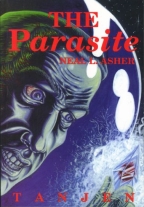 |
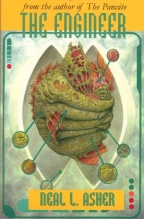 |
|
Asher's Tanjen debut novella is a great introduction to his 'Runcbile Universe', and a prime bit of UK small-press history. You can still pick this up pretty easily used. Do so now before it becomes really expensive! |
Asher's work becomes more mature in this follow-up to 'The Parasite'. |
TAC: Who's who, and what's important in the British small press scene?
Neal Asher: The answer to that changes every year. During all that time I spent getting my short stories published I saw some wonderful magazines come into existence then die when the editors discovered their task to be a labour of love that mostly cost them money. These magazines hit a wall of readership numbered only in the hundreds and couldn't get beyond it. My personal favorites on the defunct list are: Threads (Geoff Lynas), Grotesque (Dave Logan), The Zone & Premonitions (Tony Lee), and recently Kimota (Graeme Hurry). Those still going from then would perhaps not like the description 'small press': The Third Alternative (Andy Cox), BBR (Back Brain Recluse - Chris Reed), Scheherazade (Elizabeth Counihan). The best magazine recently to come into existence is Spectrum SF and I don't just say that because a recent issue has a story of mine in it (on the website). This magazine is a paperback much like the old Galaxy or Analog - professionally produced and the sort you want to keep on your shelf with your SF books. As to others ... well I haven't been reading as many of them as I should - something I intend to correct.
TAC: What brought you to set up a web site and how much time do you spend on it?
Neal Asher: I'm a writer who started out longhand, then went on to a manual typewriter, computer with green screen and Wordstar, various changes of program and computer upgrade to finally reach Word and the usual present day PC. All these latter changes were mainly brought about by my brother Martin - one of those guys who enjoys terrifying you by ripping your computer apart both physically and informationally, then putting it back together so it works even better. My awareness of the Internet grew throughout this and I came to realize that it was a superb advertising tool. When I finally went online and discovered loads of sites that had nothing to display, I realized that, because of my publishing history, I did. A few months after, I started building my website (in Word) and got it online. It was well worth the effort because about that time, Peter Lavery at Pan Macmillan contacted me in respect of sample chapters and a synopsis I'd sent him (Gridlinked), misconstrued what I was babbling about my site, and had me email him the rest of the book right then. Subsequently, after looking at my site, he was able to offer me a three-book contract on the basis of what he saw there. Now I only update when I have something interesting to add. People have told me I need a better website, but time spent mucking about with that is time I do not spend writing. Which would people prefer?
TAC: How is your experiment in Internet publishing working out? Are you actually selling stories in your story store?
Neal Asher: Not at all, actually. I think you are about the first person to realize that the stories in the store are for sale. I guess that in fact I'd forgotten that. Thing is, most of the small presses to do not pay for stories and get so many they do not have to search for them either. My intention is to start hitting your neck of the woods (more markets and more paying markets) with a few of those stories. Trouble is that like my reading of small press mags, my submissions to them has lapsed what with novel writing rising to prominence.
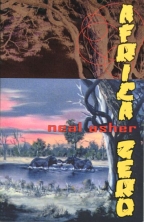 |
|
Neal Asher's Wildside Press venture is built on the same stuff as his other work -- a really wild imagination and lots of violence. Big game hunting in future Africa, Asher style -- monsters, vampires and really big guns. I'm there! |
TAC: How has your print on demand novella 'Africa Zero' sold? What led you to decide on this publishing scheme?
Neal Asher: I've always looked for new markets. I can't remember if I found Cosmos Books (linked to Wildside Press) or they found me. I sent them the two novellas that comprise that book, signed a contract, received a free copy, and that's all I've heard. Maybe it's selling, maybe it will sell. I'd like to know.
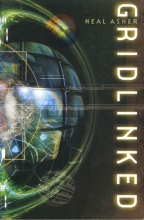 |
|
Not quite 1-2-3 -- Neal Asher's Gridlinked,w hich kicks ass and takes no prisoners, went through hell and back before making it to your hands. Perhaps appropriate, given the hellish universe that Asher likes to portray. |
TAC: Can you talk about your various deals with the British publishers? It's all as easy as one-two-three, right?
Neal Asher: A fucking nightmare until the professionals get hold of you. I have been writing for twenty years and in all that time constantly submitting synopses and sample chapters to the big boys and any other new press that seems likely. Taking just one example: Gridlinked. This book was accepted by a publisher called New Guild - contract signed - then New Guild went belly up. Tanjen, who had taken The Parasite and The Engineer, wanted to publish it and they went down the same toilet. Virgin Worlds wanted it, then they gave up trying to publish SF. When Pan Macmillan took it I thought, 'Shit, don't let me give them the kiss of death'. They took me on from the slush pile (a miracle in itself as I wasn't represented by an agent), I proved myself to them by producing what they wanted and they reciprocated with professionalism.
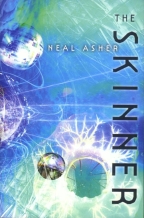 |
|
Buy this version of this book on the web now -- it's one of the best I've read this year. Imaginative, ultra-horrific and weirdly touching. That's a hard combination to pull off. |
TAC: How did you come to the American publishers?
Neal Asher: I was taken on by Pan Macmillan without an agent, and that is how the situation remains unless someone can come up with a damned good reason why I should shell out ten to fifteen per cent of my income for the privilege. Pan Mac act as my agent and sell my books to various other publishers as well as distributing my books world-wide. What better recommendation is there? Thus far my books are in Germany and now a major publisher in America has made an offer. I'm afraid I cannot say much more than that at present.
TAC: Are you taking a horrific approach to science fiction or a science fictional approach to horror?
Neal Asher: Er, the former ... maybe. It was Anthony Barker of Tanjen who came up with the label 'Master of SF Horror', which though resulting in me pushing my ego around in a wheelbarrow, I didn't think it really applied. Mostly I concentrate on SF and those aspects of it that most interest me. That what interests me mainly consists of flesh-eating monsters, psychotic androids, Schwartzenegger clones with big guns and exploding spaceships I guess the cause of that 'horror' label.
TAC: Have you written any fantasy? How about supernatural horror?
Neal Asher: My first novel was a longhand fantasy that now sits in an attic somewhere (maybe someone'll get rich on that in later years). I subsequently went on to writing the 'fantasy trilogy'. The influence of the small presses and my short story writing narrowed my focus on SF, though I did not give up on the fantasy. Completing the trilogy I wrote the first book of a second trilogy and continued trying to get published. I even had an agent for a little while. No luck though, so I concentrated on my short stories and subsequently the SF novels. As it stands The Staff of Sorrows, Assassin out of Twilight, The Yellow Tower and Creatures of the Staff (First book of The Infinite Willows) are all waiting for me to take another look at them. Now I've given up the day job (last ten years I've been doing contract grass cutting) I might get more time to concentrate on those books. Certainly I know I've learnt a lot more since then.
TAC: Have you written any "suspense" novels or mysteries?
Neal Asher: Yep. It's called Frog Wine and concerns farmers in Essex growing GM cannabis. Also involved are London villians; a love story; a psychotic tree-surgeon called Nailer; and how to dispose of a corpse utilizing a chainsaw, wood chipping machine and a rotovator. Like the fantasy it awaits my attention. Like Gridlinked it went through a publishing farrago in which it was going to be taken then wasn't. The company concerned told me it was unrecoverable after I extended it, even though three of their readers had enjoyed it. The next year that same company opted out of fiction publishing.
TAC: Can you talk about your interest in TV scripts? What have you done, and what would you like to do?
Neal Asher: Well, I've had a go at most things, and the scripts, like the above, went nowhere. Presently I have a script for a one hour play set in a near future in which capital and corporal punishment have been reintroduced for primetime TV, and one for a serial of three episodes concerning strange doings in the English countryside, in which something odd is living underneath the woods, villagers all possess the same birthmark, and a local villain has got his hands of a briefcase atomic. Respectively they are 'Executioner's Prayer' and 'Trines'. Maybe one day someone will be interested. Recently acquiring Sky Digital I see that there's a lot more of that stuff out there than there used to be.
There is another aspect of writing scripts that's worth a mention: it is an excellent discipline for writing dialogue, as you are not continually describing your characters actions, expressions, situation, and must bring all that out in said dialogue. For me it was all part of the learning curve.
TAC: Can you give your fans a glimpse at what they can expect in the near future?
Neal Asher: Lots of books. Macmillan have got 'The Line of Polity' which is a follow-up to Gridlinked, but with more of that hostile life found in The Skinner. Line will come out next March. At present I am working on the first book of my next three book contract. This is called Cowl and concerns the lethal far-future human/creature, Cowl, who has traveled back to the beginnings of life on Earth where he is attempting to change the entire history of the human race; factions of far-future humans beating the living hell out of each other; organic time machines of two different types, one type being scales from the back of a creature called the torbeast - a vast creature controlled by Cowl; a prostitute from our time being dragged back through the eons as a sample of the future; a programmed killer, first hunting her then being given a more important mission; and all sorts of flesh-eating prehistoric monsters. After Cowl I'll be doing Brassman, which continues the Gridlinked sequence. And after that I'll be doing The Voyage of the Sable Keech. Anyone who has read my first two books with Macmillan will have some idea of what these last two are about.
Look for more news about Neal Asher and more book reviews of his work in days and weeks to come. In the interim, hie thee hence to yon bookseller and pick up what you can of his works. I think you'll find it a great investment in reading enjoyment.
Thanks,
Rick Kleffel